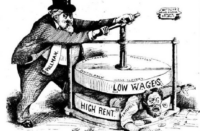Every so often, history presents us with an amazing affirmation of our humanity, a sense of continuity, the passing on of the torch. This applies supremely to Robert Burns’s song “For A’ That.”

Burns was highly regarded in the USSR
Robert Burns, born on 25 January 1759, lived in an age of revolution: the American War of Independence, the French Revolution, the anti-slavery and anti-colonial revolution in Haïti and an agrarian revolution in Scotland, to name some landmark events. Modernised agriculture brought with it financial gain on the one hand and social polarisation on the other—wealthy tenants versus a rural proletariat.
A class struggle in the modern sense ensued. Those owning the means of production, providing food to the battlefields and the industrial centres, made enormous profits. The poor had too little to live on; financial crisis, hunger and tuberculosis swept over Scotland.
The dispossessed of Scotland, among them Robert Burns, warmly welcomed the new ideas coming from across the Atlantic—“We hold these truths to be self-evident: that all men are created equal”—joined a few years later by the French declaring a new era of liberty, equality, and fraternity. Not long before his early death at the age of thirty-seven in 1796, Burns wrote his most famous song, “For A’ That,” a song celebrating and affirming the idea of the universal brotherhood of the dispossessed.
Is there for honest Poverty
That hings his head, an’ a’ that;
The coward slave—we pass him by,*
We dare be poor for a’ that!
For a’ that, an’ a’ that,
Our toils obscure an’ a’ that,
The rank is but the guinea’s stamp,†
The Man’s the gowd‡ for a’ that.
*we pass by the coward who is ashamed of his poverty
†aristocratic rank is only the face stamped on a coin
‡gold
At the heart of all Burns’s poetry are the concerns of the ordinary people of Scotland. By addressing the specifics of their lives, Burns achieves a universality that applies to all working people. He gives voice to milkmaids and ploughmen, weavers and farmers’ wives, soldiers and travelling musicians, creating a cosmos in which ordinary folk can recognise themselves as part of a whole community.
Such a complete and realistic portrayal of the people asserts their humanity and engenders pride in themselves, and a hatred for their enemies. Depictions like these help Burns’s readers to feel the conflict between their humanity and the misery they endure. Ultimately, this portrayal of the ordinary people points to the need for revolutionary change.
This logic lies at the core of Burns’s poetry, and perhaps most outspokenly in “For A’ That.” This song reflects a sense of dignity, a scorn for the rich and a longing for universal brotherhood. The ideas of liberty, equality and fraternity are no abstract slogans but already exist, rooted in the lives of the people, logical projections of their humanity.
Then let us pray that come it may,
(As come it will for a’ that,)
That Sense and Worth, o’er a’ the earth,
Shall bear the gree,* an’ a’ that.
For a’ that, an’ a’ that,
It’s coming yet for a’ that,
That Man to Man, the world o’er,
Shall brothers be for a’ that.
*take the prize
Ferdinand Freiligrath, a poet of the German bourgeois revolution of March 1848 to July 1849 (and later a renegade), first translated “For A’ That” into German, as “Trotz Alledem,” in 1843. Freiligrath, who knew Marx and Engels, was a member of the Bund der Kommunisten (Communist League—founded in London in 1847) and a member of the editorial board of the revolutionary daily Neue Rheinische Zeitung, published by Marx and Engels between 1848 and 1849.
At this time Freiligrath picked up Burns’s torch of revolution, changing the text of “Trotz Alledem” to suit specifically the German situation while retaining the title, rhythm, and main idea. It was printed in the Neue Rheinische Zeitung on 6 June 1848, and this text survives in the German political song movement to this day.

The final edition of the Neue Rheinische Zeitung, printed in red ink. Its editors were threatened with arrest or exile. Marx emigrated to London.
On 8 November 1918 the German sailors’ mutiny in Kiel sparked revolutionary revolt throughout the country. When it reached Berlin, Karl Liebknecht proclaimed a free socialist republic of Germany. On 9 November, Liebknecht and Rosa Luxemburg founded a new daily revolutionary paper, Die Rote Fahne (The Red Flag), as the paper of the Spartacus League, of which they were the leaders, and shortly afterwards of the Communist Party, founded on 1 January 1919.
Two weeks later, on 15 January 1919, both Liebknecht and Luxemburg were murdered. Liebknecht had written his editorial for 15 January the previous day. It is his final public statement, and his legacy. The article, seizing the torch of revolution, is entitled “Trotz alledem” (“For all that”), and it ends:
The defeated of today will be the victorious of tomorrow . . . The German working class’s way to Golgotha is not over . . . we are accustomed to being plunged from the peak into the depths. Yet our ship keeps a straight course firmly and proudly to its destination.
And whether we will still be alive when this is achieved—our programme will live; it will govern the world of liberated humanity. For all that!

This window can still be seen in the former GDR Council of State building in Berlin.






